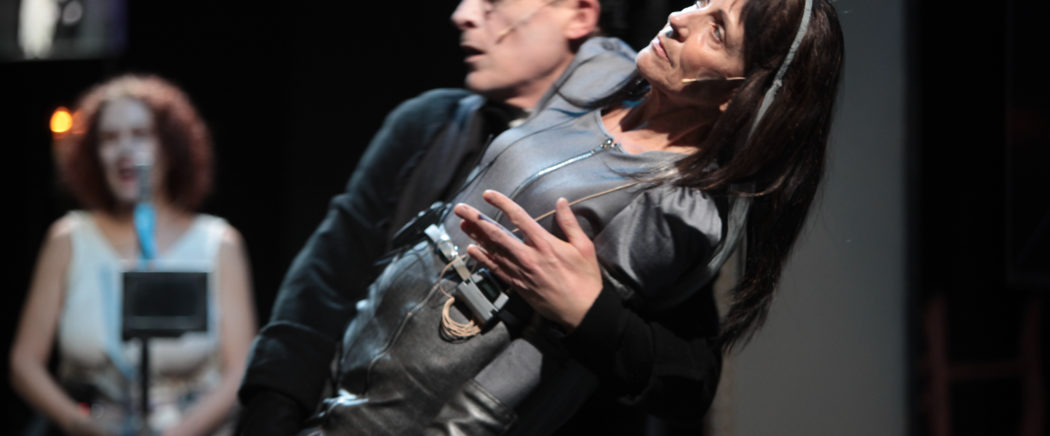“The piece isn’t about the past,” Elizabeth LeCompte once said about The Wooster Group’s first production, SAKONNET POINT, in 1975. “It’s really about us thinking about the past.” The statement is no less true of one of the Group’s newest works, A PINK CHAIR (In Place of a Fake Antique), created more than 40 years later. Why create a “fake antique”—an impersonal reconstruction of an inaccessible past, in this case the theater of the great Polish director Tadeusz Kantor — when the company is most interested in how that history can change them. The former is inert, while the latter is in flux. The “thinking” that LeCompte stages is an active and collaborative process, not a private meditation, as Group members interview Kantor’s daughter, review grainy videotapes of his productions, and tentatively attempt their own versions. As LeCompte once wrote about another Wooster Group piece — HAMLET (2007), based on Richard Burton’s 1964 production—she is “an archeologist inferring an improbable temple from a collection of ruins.”
In that production and in this one, inferences never ripen into certainties, nor are the ruins replaced by convincing replicas. That’s intentional. The Wooster Group is honest about the limits of their historiography. They summon the dead with no expectation of their arrival. They probe lacunae in their knowledge, never hoping to fill them. For these archeologists, the work of excavation matters more than any discovery. It’s significant that in A PINK CHAIR LeCompte engages with a fellow artist. Over the last five decades, The Wooster Group has channeled members of an expanding and improbably diverse aesthetic family—Jerzy Grotowski, William Forsythe, Alec Guinness, Irene Worth, Lenny Bruce, Shaker singers, Geinin actors, and many others—hoping, perhaps, to map hitherto unacknowledged strands of their theatrical DNA. These peers and predecessors attract LeCompte’s attention not only for their work. They are equally interesting as models of commitment and images of surviving self-doubt, as LeCompte and her actors manage their own vulnerability and uncertainty.
Those challenges lie behind the many scenes in which the actors complete seemingly insignificant tasks. As they move furniture and manipulate props, or drag cables and slide video monitors, they anchor themselves to the material world. Objects provide ballast for the intuitive process of invention, and for communing with ghosts. Hence a chair’s pride of place in this work’s title. In performance, it’s easy to miss: LeCompte has relegated it to the stage’s margins or background. But even there it radiates private meaning. LeCompte found the chair years ago on a Soho sidewalk, and previously used it in NAYATT SCHOOL and EARLY SHAKER SPIRITUALS. As such, it offers a landmark from the Group’s history as it navigates disorienting differences in culture and language. “I’m trying desperately to find the trajectory,” LeCompte once said about Three Sisters, the source-text of BRACE UP! Her comment could also apply to more recent works. A PINK CHAIR joins POOR THEATER, THE TOWN HALL AFFAIR, and her latest piece, SINCE I CAN REMEMBER, to trace a different trajectory—one that stretches from the 1960s and 70s European avant-garde through 1970s feminism up to the current and ongoing mourning for that lost world. The four productions restage scenes from LeCompte’s education. Watching them now, we watch her become a student again, as she scans the stage for clues about how she became the artist she is today.
Marc Robinson is Professor of English at Yale University and Professor in the Practice of Dramaturgy and Dramatic Criticism at the Yale School of Drama. He is the author of “The American Play” and other books. He is a fellow at the New York Institute for the Humanities at NYU.
